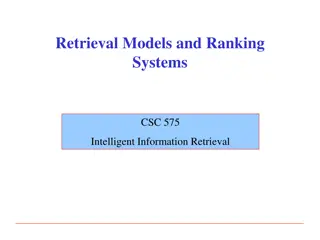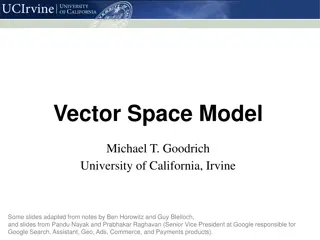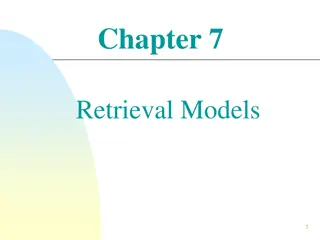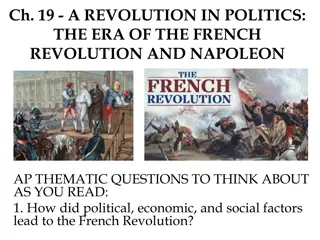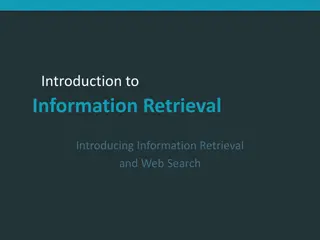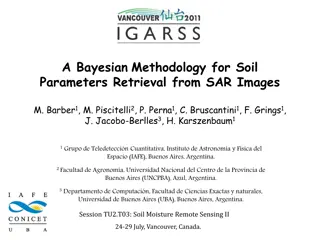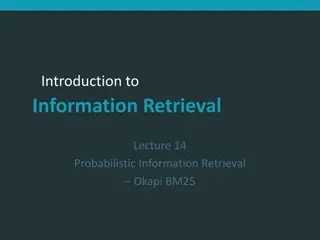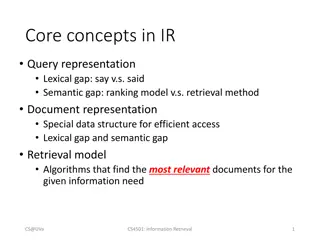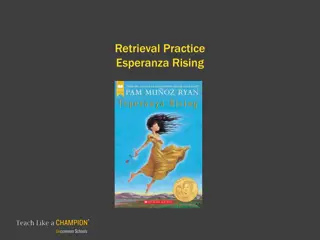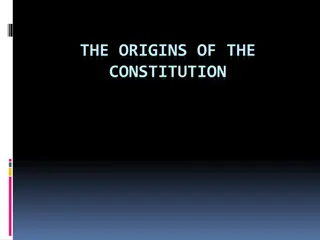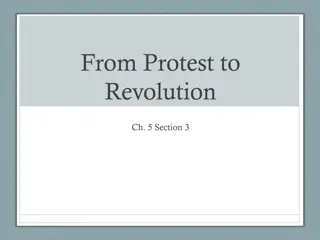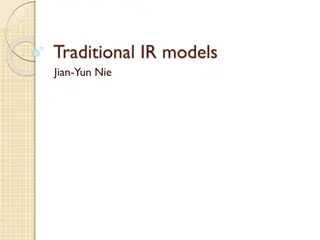Retrieval Practice: American Revolution Lesson Insights
Explore key concepts such as Patriots, Loyalists, slave codes, manumission, and more from lessons on the American Revolution. Delve into the characters, actions, and historical context of the era through thought-provoking questions and answers. Understand the roles of individuals like Curzon and Abigail Adams in the revolutionary struggle. Gain insights into the Continental Congress, dehumanization, and women's roles during the Revolutionary War Era.
Download Presentation

Please find below an Image/Link to download the presentation.
The content on the website is provided AS IS for your information and personal use only. It may not be sold, licensed, or shared on other websites without obtaining consent from the author. Download presentation by click this link. If you encounter any issues during the download, it is possible that the publisher has removed the file from their server.
E N D
Presentation Transcript
Retrieval Practice Chains
Retrieval Practice: Lesson 5 1. What is a Patriot? 2. What characters in the novel would be considered Patriots? 3. What British actions caused American Patriots to become angry and frustrated? 4. What is a Loyalist? 5. What characters in the novel would be considered Loyalists? 6. What is manumission? 7. How does the concept of manumission apply to Isabel? Take 3 minutes to complete these questions
Retrieval Practice: Lesson 5 (contd) 8. What are some of the ways that slave codes controlled the behavior of enslaved people? 9. What is one similarity between the life of an indentured servant and the life of an enslaved person? 10. Is Curzon a Loyalist or a Patriot? Why? Take 3 minutes to complete these questions
Retrieval Practice Answers: Lesson 5 1. A Patriot is an American colonist who rejects British rule and desires independence. 2. Master Bellingham, Curzon, and others would be considered Patriots. 3. The Stamp Act and other taxes known as the Intolerable Acts frustrated the colonists. 4. A Loyalist was an American colonist who chose to remain loyal to British rule. 5. The Locktons are Loyalists. 6. Manumission refers to the voluntary freeing of an enslaved person by his or her enslaver. 7. Miss Mary Finch intended to free Isabel and Ruth after her death through manumission, but Mr. Roberts ignored this request.
Retrieval Practice Answers: Lesson 5 (contd) 8. Slave codes, strict laws controlling the behavior of enslaved people, meant that enslaved people were not allowed to own property, to gather in groups, or to testify in court (among other restrictions). 9. Both enslaved people and indentured servants were required to work hard for masters who could be cruel, but unlike enslaved people, indentured servants terms ended after a contracted period of time. 10. Curzon is a Patriot because he believes in fighting for freedom. Self-score: ________/10
Retrieval Practice: Lesson 9 1. What is the Continental Congress? 2. Would a Patriot or a Loyalist be more likely to recognize the authority of the Continental Congress? 3. Who in Chains has a plan for turning fence-sitters into Loyalists? What is his or her plan? 4. What is first-person narration? 5. What was the traditional role for women during the Revolutionary War Era? Take 3 minutes to complete these questions 6. Who was Abigail Adams? 7. What is dehumanization? Give an example from the novel.
Retrieval Practice: Lesson 9 (contd) 8. Do you think Curzon would be willing to sacrifice for the Patriots? Why or why not? 9. What is an indentured servant? How is an indentured servant s life different from an enslaved person s? 10. Was the Boston Tea Party Boston Tea Party the act of Patriots, Loyalists, or fence-sitters? How do you know? Take 3 minutes to complete these questions
Retrieval Practice Answers: Lesson 9 1. The Continental Congress was a convention of delegates from the Thirteen Colonies that became the governing body of the United States during the revolution. 2. A Patriot would be more likely to recognize the authority of the Continental Congress. 3. Master Lockton has a plan to bribe fence-sitters into joining the Loyalist cause using money from Great Britain. 4. First-person narration refers to a story told by a narrator who is a character in the story. 5. Traditionally, women were expected to become wives and mothers and maintain the household. 6. Abigail Adams was the wife of America s second President, John Adams, and an advocate for the rights of women. Self-score: ________/6
Retrieval Practice Answers: Lesson 9 (contd) 7. Dehumanization refers to treating a person as though he or she is not a human being. Madam Lockton dehumanizes Isabel by changing her name and dehumanizes Ruth by treating her like a little doll. 8. Curzon would be likely to sacrifice for the Patriots because he believes in their cause and the freedom they promise. 9. An indentured servant is a person who signed a contract agreeing to work for a certain number of years, in exchange for food, clothing, and shelter. Unlike an enslaved person, an indentured servant could one day become free. 10. The Boston Tea Party was the act of Patriots because it was an act of resistance against British taxes. Self-score: ________/10
Retrieval Practice: Lesson 12 1. Who was Thomas Hickey? 2. Explain one scene in the novel that could be described as a commotion. 3. Where did the British bring their ships? Why did they choose that location? 4. Why would Loyalists plot to kill George Washington? 5. Give an example of a character we might see as detestable. 6. Why were colonial punishments public? 7. Explain what the Declaration of Independence meant in the conflict between the colonies and Great Britain. Take 3 minutes to complete these questions 8. What does tension refer to in literature?
Retrieval Practice: Lesson 12 (contd) 9. What is a tyrant? Who in the novel would you describe as a tyrant? 10. Why might an author juxtapose two scenes, characters, or ideas? Take 3 minutes to complete these questions
Retrieval Practice Answers: Lesson 12 1. Thomas Hickey was a member of George Washington s Life Guard who was accused of trying to assassinate Washington and publicly executed. 2. The public execution of Thomas Hickey was a commotion. <insert other examples here>. 3. The British brought their ships to New York Harbor to capture New York City. 4. Loyalists may have plotted to kill George Washington because they thought the Patriots would be easier to subdue without their leader. 5. Madame Lockton is a detestable character. <insert other examples here>. 6. Colonial punishments were public because they were intended to discourage other individuals from committing crimes. Self-score: ______ /5
Retrieval Practice Answers: Lesson 12 (contd) 7. The Declaration of Independence was a document adopted by the Continental Congress that severed ties with Great Britain. 8. In literature, tension is a sense of heightened uncertainty and interest a reader experiences as the climax approaches. 9. A tyrant is a leader or ruler who uses their power unfairly or cruelly. The Patriots would call King George the III a tyrant; Isabel would call the Locktons tyrants. 10. An author might juxtapose images or ideas to emphasize the contrast between them. Self-score: ______ /5
Retrieval Practice: Lesson 17 1. What are the stocks? Why might someone be put in the stocks? 2. What mark is Isabel branded with? Why? 3. What is the river Jordan? 4. What might the river Jordan symbolize? 5. What other symbols emerge in Isabel s branding scene? 6. Who was defeated at the Battle of Brooklyn? 7. A month before in the Battle of Brooklyn (in July 1776) a very important document was officially adopted by the Continental Congress. What was it? 8. Who was the primary author of this document? Take 3 minutes to complete these questions
Retrieval Practice Answers: Lesson 17 1. The stocks were a public punishment meant to shame someone accused of a crime or other offense. 2. Isabel is branded with the letter I for Insolence at Madam Lockton s request. 3. The River Jordan is a river in the Middle East with major significance in Judaism and Christianity. 4. The River Jordan may symbolize freedom, the struggle for liberty, or healing, 5. Images of nature are also symbolic in Isabel s branding scene. 6. The British force the Patriot troops to retreat in the Battle of Brooklyn. 7. The Declaration of Independence was adopted by the Continental Congress. 8. The Declaration of Independence was primarily written by Thomas Jefferson. Self-score: ______ /8
Retrieval Practice: Lesson 22 1. What was the Boston Tea Party? 2. What were some British actions that frustrated American Colonists after the French and Indian War? 3. Who was Abigail Adams? 4. What was significant about the Battle of Bunker Hill? 5. Name the set of laws defining the status and rights of slaves. 6. Who was the principal author of the Declaration of Independence? 7. What does the phrase Lobsterback refer to? Take 3 minutes to complete these questions
Retrieval Practice: Lesson 22 (contd) 8. What does the phrase Middle Passage refer to? 9. Who wrote Common Sense? Why was it important? 10.Name the laws passed by British Parliament to punish American colonists. Take 3 minutes to complete these questions
Retrieval Practice Answers: Lesson 22 1. The Boston Tea Party was an act of resistance to British Taxes in which Patriots threw British tea into the Boston harbor. 2. After the French and Indian War, the colonists grew frustrated by the additional taxes imposed by Great Britain (including the Stamp Act and other Intolerable Acts). 3. Abigail Adams was the wife of John Adams, America s second president, and an advocate for the rights of women. 4. The Battle of Bunker Hill was the Revolution s first major battle and though it was won by the British, the colonists gained confidence. 5. The slave codes defined the status and rights of enslaved people. 6. Thomas Jefferson was the principal author of the Declaration of Independence. 7. Lobsterback was a slang term for a British solder.
Retrieval Practice Answers: Lesson 22 (contd) 8. The phrase Middle Passage refers to the arduous Sea journey undertaken by slave ships from West Africa to the West Indies; one stage of the Triangle Trade 9. Thomas Paine wrote Common Sense, an argument for American independence that persuaded many colonists to support the Patriot cause. 10. The Intolerable Acts were passed by the British Parliament to punish American colonists. Self-score: ______ /10
Retrieval Practice: Lesson 25 1. Explain the difference between an indentured servant and an enslaved person. 2. What is manumission? 3. Who was Phyllis Wheatley? 4. What was the traditional gender role for women during the Revolutionary War era? 5. Explain dehumanization and give an example of it from the novel. 6. Explain empathy and give an example of it from the novel. 7. What is a fence-sitter? Take 3 minutes to complete these questions
Retrieval Practice: Lesson 25 (contd) 8. If you were a Loyalist, would you abide by the laws of the Continental Congress? Why or why not? 9. Why might an author use first-person narration? 10. Who was Thomas Paine? Take 3 minutes to complete these questions
Retrieval Practice Answers: Lesson 25 1. An indentured servant was contracted to work for a set period of time; an enslaved person was in bondage for life. 2. Manumission refers to the voluntary freeing of an enslaved person by an enslaver. 3. Phyllis Wheatley was the first published African American female poet 4. Women were traditionally wives and mothers; their authority was limited. 5. Dehumanization refers to treating a person as though he or she is not a human being. Madam Lockton dehumanizes Isabel by changing her name and dehumanizes Ruth by treating her like a little doll. 6. Empathy refers to 7. A fence-sitter was a person who did not take a side in the conflict between the Patriots and the Loyalists. Self-score: ______ /6
Retrieval Practice Answers: Lesson 25 (contd) 8. A Loyalist would likely not recognize the authority of the Continental Congress because they remained loyal to Great Britain. 9. An author might use first-person narration to cause a reader to empathize with the narrator or to increase suspense. 10.Thomas Paine was the author of Common Sense, an influential pamphlet that persuaded many colonists to support the revolution. Self-score: ______ /10


